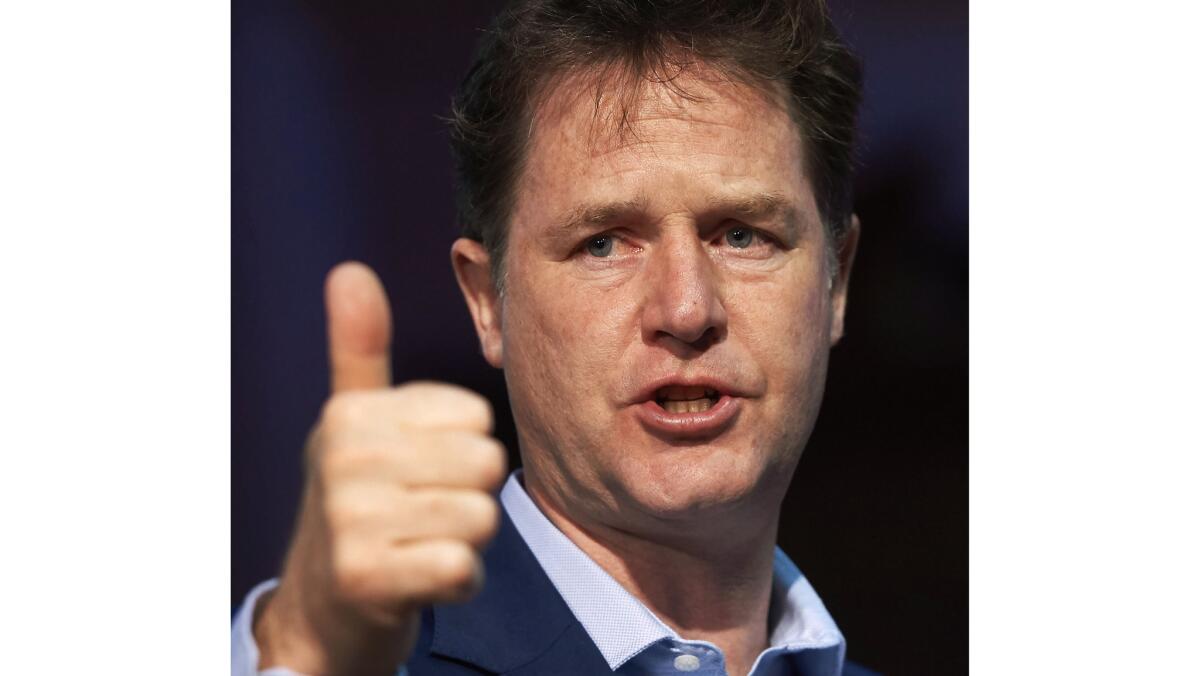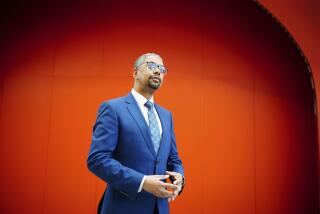Facebook hires Nick Clegg, Britain’s former deputy prime minister, to lead global affairs

- Share via
It’s often said that if Facebook were a country, it would be the largest on Earth, with a current population of 2.2 billion.
Now the social media giant is tapping an actual politician to help lead that digital nation. It’s bringing on Nick Clegg, the former deputy prime minister of Britain, as its head of global policy and communications.
Clegg,who was Britain’s second-most powerful political leader from 2010 to 2015, will be moving to California to succeed Elliot Schrage, who had held the position for the past decade. Unlike Schrage, a Harvard-educated lawyer who previously worked at Google, Clegg brings an outsider’s eye as a non-American and an insider’s perspective as a former member of the European Parliament.
Clegg’s hiring comes as Facebook Inc. seeks to navigate increasingly delicate matters of diplomacy with governments around the world, with regulators bringing fresh scrutiny to the Menlo Park, Calif., company over everything from its use of customer data to how it intends to safeguard the integrity of democratic elections.
“Our company is on a critical journey,” Sheryl Sandberg, Facebook’s chief operating officer, said Friday in a post announcing the move. “The challenges we face are serious and clear and now more than ever we need new perspectives to help us through this time of change.”
Clegg had been speaking to Sandberg and Chief Executive Mark Zuckerberg for months about the role, he said in a Facebook post.
“Throughout my public life I have relished grappling with difficult and controversial issues and seeking to communicate them to others,” he said. “I hope to use some of those skills in my new role.”
This is not the first time Facebook has turned to people with political backgrounds for help. But Clegg is perhaps the highest-profile politico to take a leadership position in the company’s history, underscoring the gravity of Facebook’s situation as it encounters mounting criticism from European policymakers.
The company faces potential fines in Europe over its recently announced data breach that affected 30 million people and exposed personal information such as users’ location and search histories, phone numbers and relationship statuses. Facebook has been penalized in the past year in Europe for allegedly misleading regulators about the details of its acquisition of WhatsApp and for missteps that led to Facebook’s Cambridge Analytica scandal. Meanwhile, European regulators forced tech companies to begin complying in May with an unprecedented new set of privacy protections for consumers, known as GDPR.
In seeking to reverse Facebook’s fortunes, particularly in Europe, Clegg’s political instincts will be put to the test.
Once hailed as a rising star in British politics, Clegg brought his relatively small Liberal Democrat party to prominence in Britain’s 2010 elections when he sharply criticized the Conservative party’s David Cameron. Cameron’s party went on to win the most seats in the general election, but not enough to form a governing majority — giving the charismatic Clegg an opening to form a novel and unexpected political partnership with the Conservatives.
Despite generating optimism for a new future with that alliance, Clegg soon found himself on the wrong end of public opinion. He had to back away from a party pledge to reduce college costs, ultimately voting with Conservatives to raise the maximum amount students could be expected to pay for their education as Britons protested in the streets.
Clegg and his party were trounced in the next election, losing 86% of their seats in Parliament. Clegg conceded it was a “cruel and punishing night” for the Liberal Democrats.
But Clegg’s defenders say his broader experience could be a boon to Facebook as the company seeks to repair its ties to policymakers.
“There will be few Anglo-Saxon voices that have as much resonance in Europe as Nick’s,” said Tim Gordon, the former chief executive of the Liberal Democratic party who first began working with Clegg in 2012. “He’s smart, speaks multiple languages and has built strong relationships with leaders across the continent.”
Fung writes for the Washington Post.






